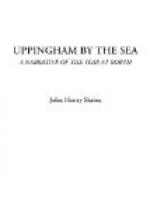After the short and sharp battle with the scarlet fever narrated above, the term went on very peacefully, but with a growing expectation that this would not be the last one in Wales. News from Uppingham of the unpreparedness of the place to receive us left little room for doubt, but the question was not decided (at least, officially) even at the date of the break-up. The prospect of a fresh period of makeshift life was not a welcome one; but the worst had been faced by this time, and found, after all, not hard to deal with. The long dark evenings of November proved a less difficulty than was anticipated. With afternoon school shifted to the hour of sunset, and with meetings of the Debating and other societies on half-holiday evenings, the dark hours did not hang heavily, and the expected tedium of an Arctic winter was not experienced. The term closed with a concert given in the Assembly Room at Aberystwith, December 13th, and another on the next night in the Temperance Hall at popular prices. On the 14th, a team of Old Boys played the usual football match against the Present School, and were beaten by two goals to one. That evening the class-list was read and the prizes given. If the boys hoped to gather from the Headmaster’s speech an intimation of where they would meet him after Christmas they were disappointed. The government had as yet no communication to make. Next morning, in the darkness before dawn, the special train carried them to their homes, to await with curiosity their next marching orders.
CHAPTER XI.—LUDIBRIA MARIS.
Sit down, and hear the last of our sea-sorrow.
“THE TEMPEST.”




